Medicine Reminders for Chronic Patients
Product design / Research / Market Analysis / Healthcare
Connect and Heal, Mumbai
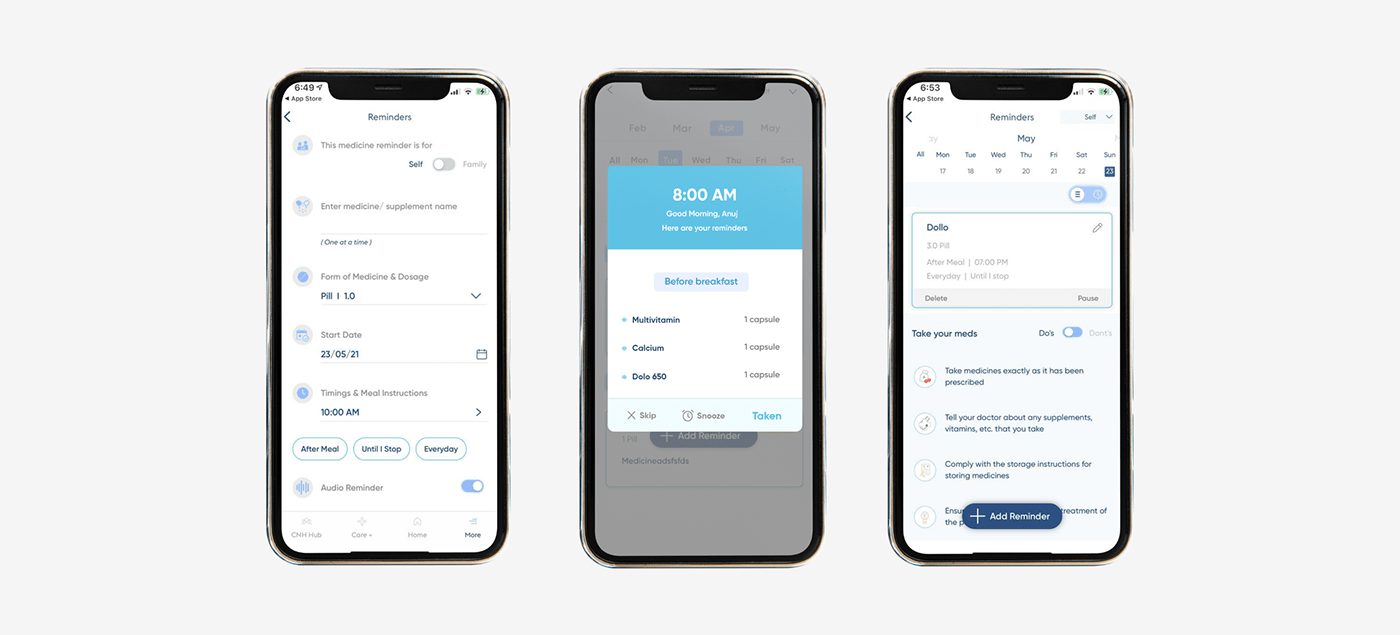
A product aimed to solve all cases of unintentional medication non-adherence which
are caused by simple forgetfulness
are caused by simple forgetfulness
Team Role
- Timeline and duration: August2019 - April 2021 (18 months)
- For this project, I am a sole designer in the company
- I have designed all facets of design including information-architecture, user task flows, interaction, visual, product, and prototyping.
- I also conducted user research using methods such as interviews, surveys, focus groups, and participatory design to address both user behavior and attitudes.
- Deliverables: Information architecture, style guide & design system, onboarding & login flow, and branding.
Context
Taking prescription medication is a routine part of everyday life for nearly 52% of all Indians. Even with the risk of facing dangerous consequences for failing to consume these, sometimes very essential, medications, patients can still forget to take them due to simple forgetfulness and unintended neglect.
With this initial information about the space, I dug deeper to understand the problem better.
Users & Audience
Our initial data-analysis showed that the users coming to CNH Care app were chronic patients, migrant patients, or caretakers. But all of them had voiced their need for a reminder tool through customer tickets and feedbacks.
I conducted semi-structured user interviews and studied the ways our users were buying and taking medicines. I observed and questioned patients or caregivers while they tried to go around doing their medical tasks.
These made me understand their habits, frustrations and critical pain-points. We also sent out surveys to our users to gather more quantitative information. These were the key insights which were unveiled :
- Almost all users perform specific tasks to help them remind take medicines. These include placing their medicine in locations that will have a higher chance of attracting their attention.
- Around 20% users were using their smartphones to set alarms. However, these were hard to use and very rigid in structure.
- A few users (usually chronic) used physical products to remind them to take medicines.
- Other chronic patients have made habitual changes which took them 4-5 months.
- None of the users remember the name of the medicine after a week. They tend to
identify the medicine by its color, shape or packaging.
identify the medicine by its color, shape or packaging.
Market analysis
p> I asked our users during the interviews on the tools they currently use. These were digital as well as physical products. I spent time to understand the fundamental offerings, positioning, and differentiators of each of these products.

some of the physical tools present in the market which work as medicine reminders
Epill and Epillmedtimer are some of the physical reminders present in the market. These have a medicine case in which all the pills are stored. Some key-points users mentioned:
- They do not tell about the dosage of medicines to be taken
- On the other hand, these are helpful triggers to know when the medicines are going to end
Designed mainly for Alzheimer patients
Extremely costly. Some of them cost as high as $250 (INR 16,000)
- Setting up a reminder is not easy at all. Also, not a lot of adjustments in timings and other variations can be done.
- It isn't an intelligent tool and works just as a simple alarm tool
Next, I evaluated the current mobile app solutions existing on the app stores (Android and iOS). According to a paper written in 2020 by Stawarz, Cox, and Blandford in 2014, there are as many as 229 mobile applications which can be considered in some way to be a medicine reminder tool.
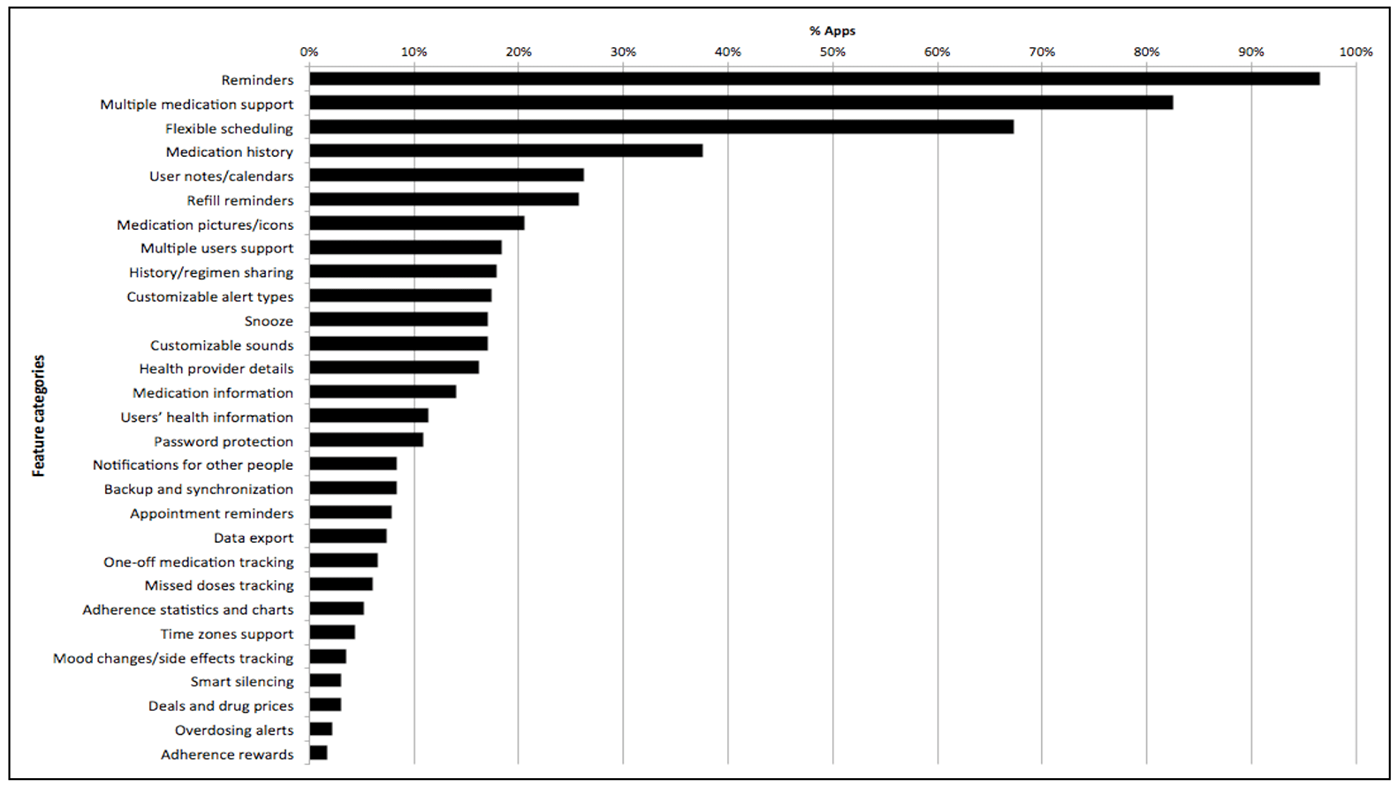
The functionality offered by smartphone reminder apps. Source: usabilitypanda
As we can see from this graph, apps provide a varying amount of functionality. However, all of them need the user to set up the reminder by going through a long, tedious process. In many cases, these reminders are very similar to SMS reminders or the phone alarm clocks and they do not have must-have actions such as snooze present.
Other issues found during the contextual inquiries:

- Very long and confusing form to fill to add a reminder.
- Not usable for irregular pill dosages. Inflexible and not robust.
- No adherence tracking
- Hygiene alarm functionalities such as snooze, smart silencing and smart alerts not been used.
Patients mostly remember pills by their shape and color and not their name. None of the tools have an option to identify meds by their shape and color.
- Almost all applications do not use the full potential of the platform.
Design Response
Using the Connect and Heal ecosystem
Connect and Heal has built an entire ecosystem of products for doctors and other healthcare providers. Doctors can quickly, and seamlessly create and share prescriptions with patients. CNH, using the data and medicine information present in the prescriptions shared by doctors, sets up reminders for the patients automatically on their health app.

Self-addition of reminders
For patients who do not go to doctors who use any of the Practo software, we created a straightforward tool to add reminders. Smart defaults, clean interface, and a flexible structure made the feature very easy to use.
We went through many iterations, tested them with users, got a lot of feedback before finally rolling out the final product on to the CNH Care app.
The objective was to design an interface which would require little to no technical knowledge and hence could be used by any user on the Connect and Heal ecosystem who needs to take medicines.
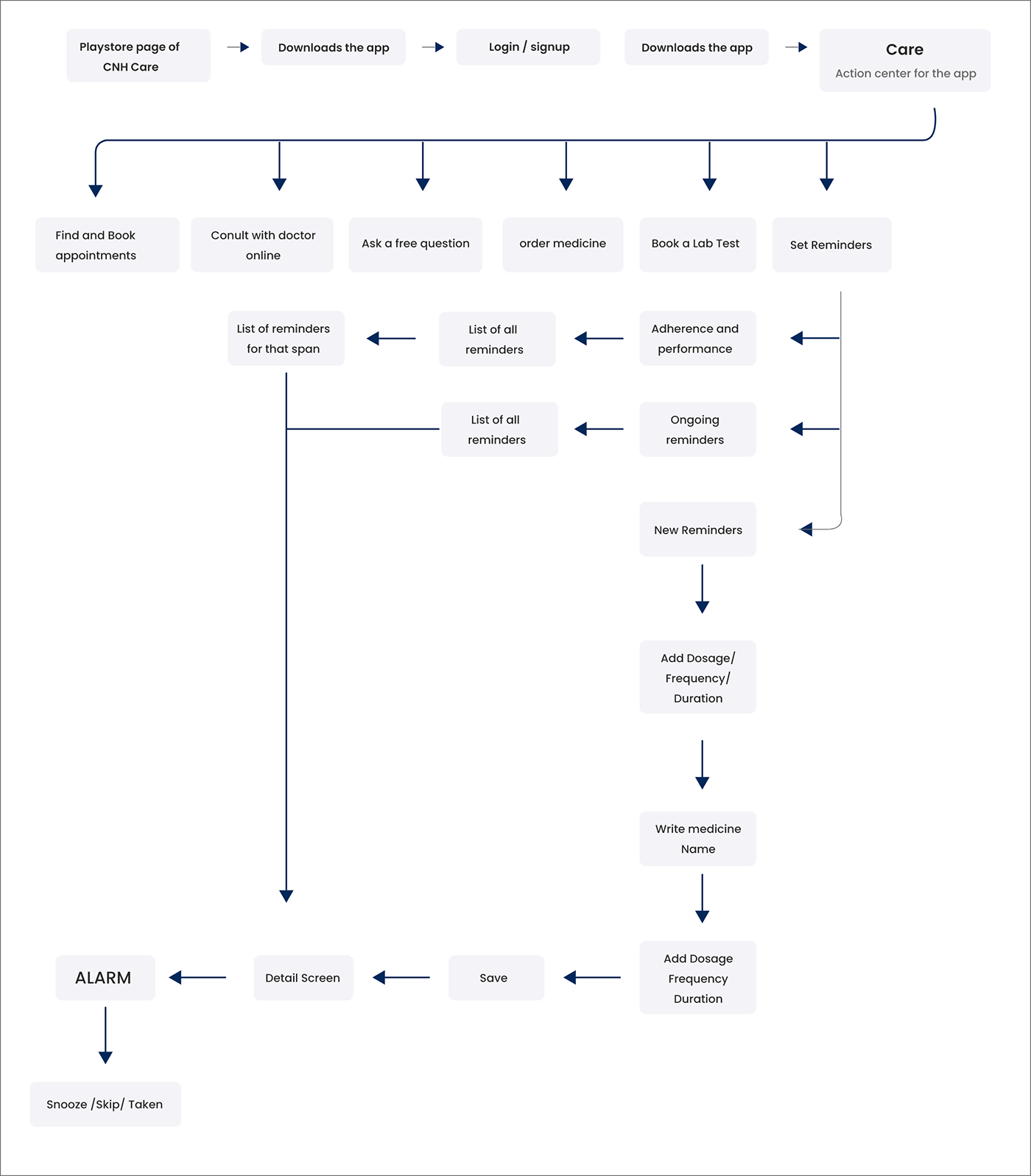
User flow for adding a reminder to the app
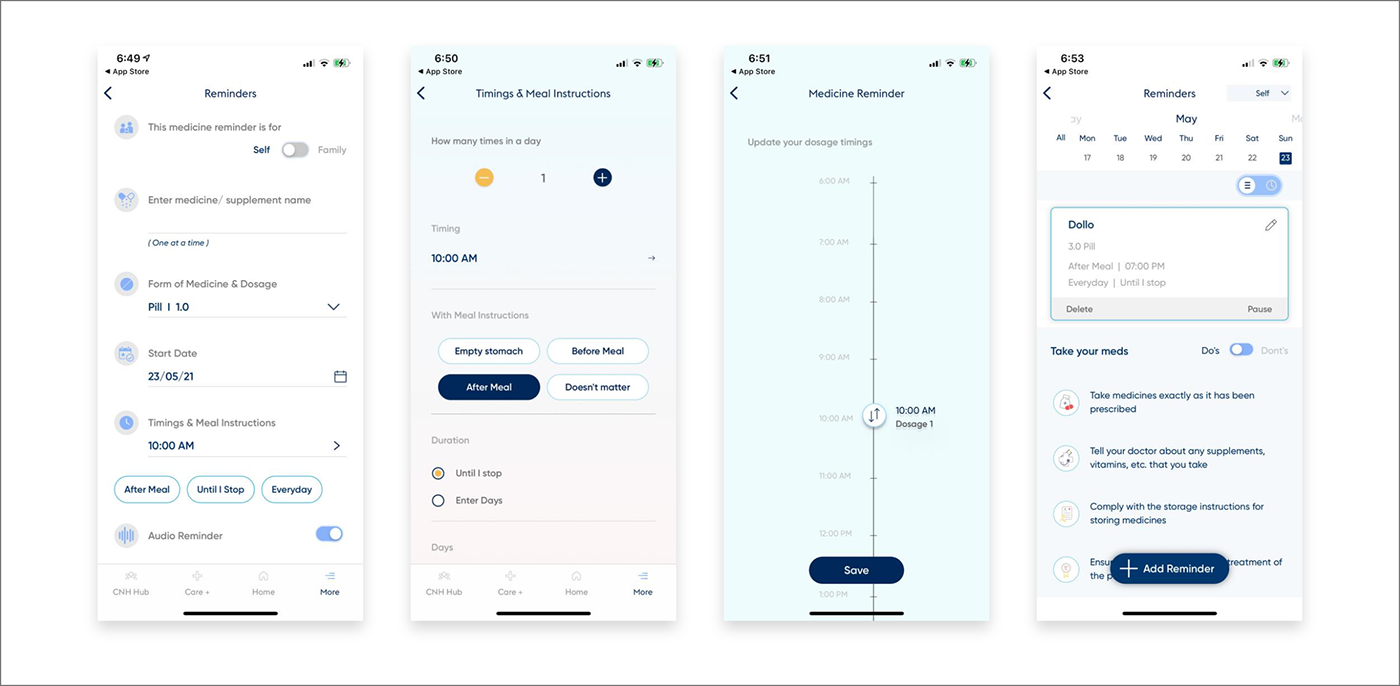
Some of the iterations made for the reminder addition flow
Notifications and alerts
We took advantage of mobile platform's own notification system and created an end-to-end notification framework for users to be
reminded on when to take their medicines.
reminded on when to take their medicines.
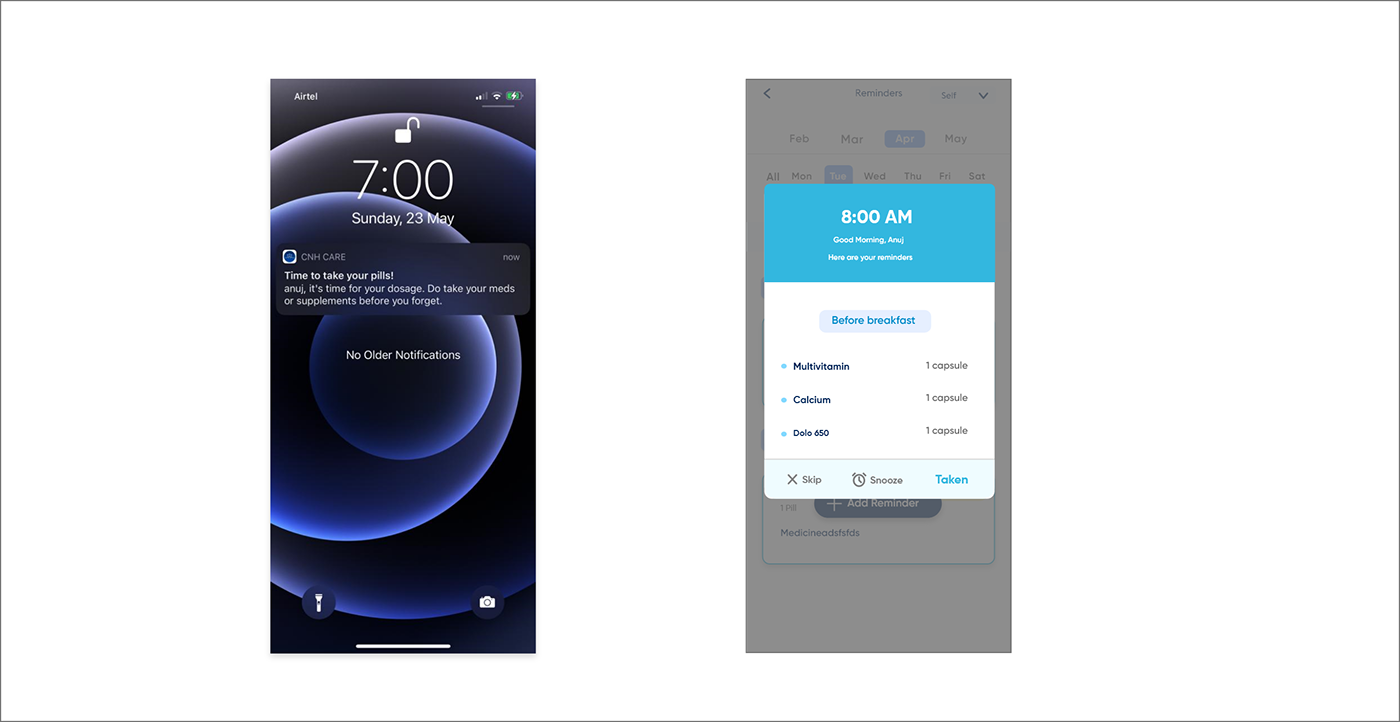
Notification and widgets created to increase the usability of reminders
Current version
The product took a lot of iterations and redesigns to reach a minimum desirable experience for our users.
We know the pain-points faced by our users in the current solution provided to them and worked tirelessly to fix them.

Outcome
Reminder is a tool which was aimed to help patients solve all cases of unintentional medication non-adherence which are caused by simple forgetfulness. The product has seen some fantastic results since its launch. However, it is still day one here.
- Extremely high user engagement.
- 100,000+ reminders set till date.
- Customer satisfaction (CSAT) above 4.5


